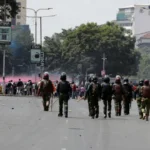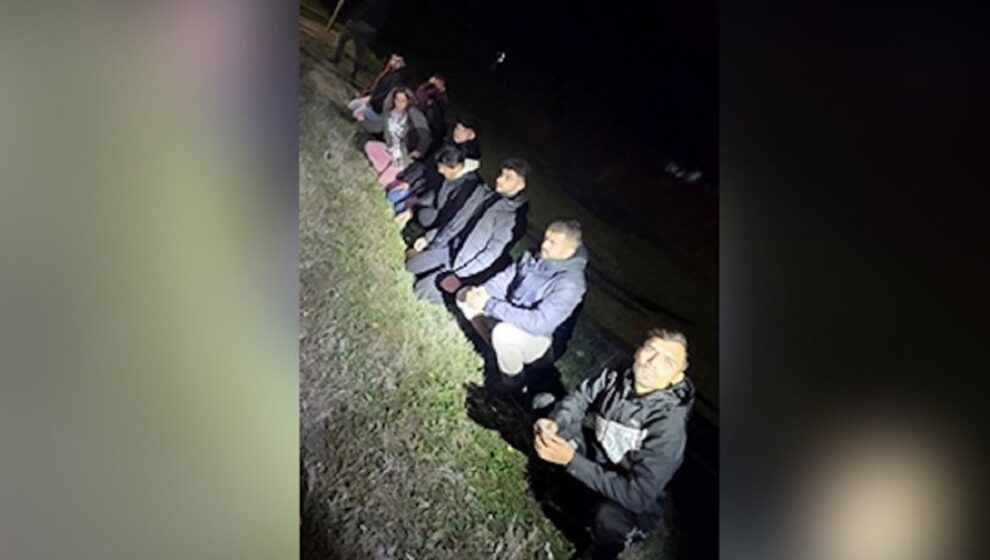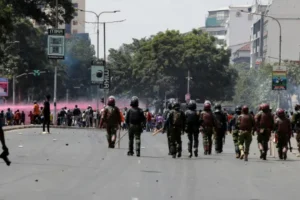There has been a sharp increase in the number of illegal migrants travelling via Southeast Europe to the EU countries of Central and Western Europe this year, and the incipient new migrant crisis is expected to worsen significantly after the outbreak of fighting between Israel and Hamas.
This has prompted several Schengen members in the region to reintroduce border controls with their neighbours, while countries outside the EU face tighter controls that are slowing down exports to the EU countries that are their main markets. While it’s too early to say how big the economic impact will be, exporters from Bosnia already say they are taking a financial hit from delayed exports to neighbouring EU member Croatia.
Balkan route revived
The Western Balkan route became a significant channel for irregular migration from the Middle East and North Africa (MENA) region to the European Union (EU) back in 2015. Two branches of the route were established during the 2015 refugee crisis. The main branch runs from from Turkey to Greece, then via Albania and North Macedonia, Serbia, Hungary and Austria. There is a second route from Turkey to Bulgaria, and via Serbia and Hungary to Central Europe. Migrants also travel via Bosnia & Herzegovina to EU member Croatia then on to Slovenia, Austria and Hungary.
After the 2015 crisis, migration along these routes subsided, and numbers slumped when movement was restricted during the coronavirus (COVID-19) pandemic.
However, data from EU border management agency Frontex shows irregular migrant entries to the bloc grew sharply in 2022. Preliminary 2022 data from Frontex show that 330,000 irregular migrants entered the EU last year, the highest number since 2016. Almost half of these, 145,000 people, arrived via the Western Balkan route.
The sudden influx of refugees from Ukraine was the indirect cause of the surge in people smuggling along the Balkan route, according to a September 2023 report from the Global Initiative Against Transnational Organized Crime.
The conflict in Ukraine triggered Europe’s largest refugee crisis since World War II, with 15mn Ukrainians seeking refuge in other European countries by the end of 2022. Coping with the arrivals from Ukraine strained border authorities’ resources, creating an opportunity for people-smuggling networks to exploit the situation as attention in states neighbouring Ukraine was diverted from their western borders.
This enabled a significant rise in irregular migrants from the Middle East using the Western Balkan route. Migrant smuggling emerged as the fastest-growing organised crime market in the Balkan region, says the report, “Borderline: Impact of the Ukraine war on migrant smuggling in South Eastern Europe”.
“While the unforeseen scale of the refugee crisis meant that much of the border authorities’ efforts and resources were occupied, people smuggling networks took advantage of the situation, and the number of irregular migrants from the Middle East travelling along the Western Balkan route soared. There are many contributing factors to this trend, but migrant smuggling has indeed resurfaced as the fastest-growing market for organised crime in the Balkan region,” says the report.
The report was published in September, before Hamas’ shock attack on Israel at the beginning of October that triggered an outbreak of fighting and Israeli reprisals. This has already led to a mass exodus from Gaza, and there are fears of further escalation in the region.
Regional hotspots
Among the Balkan hotspots where law enforcers are trying to stop the movement of illegal migrants across the region is the Serbia-Hungary border. In the last few days, Serbian law enforcers, backed by helicopters, have conducted a large-scale operation to combat illegal movements in the border area. During the police action near the Hungarian border, hundreds of migrants were found and moved to reception centres, a Serbian government statement said. On October 28, the day after the operation started, three people were killed in a firefight between two groups of migrants in Horgos near the Hungarian border.
Serbian Minister of the Interior Bratislav Gasic met his Hungarian counterpart Sandor Pinter at the Reska border crossing on October 30, and the two agreed on concrete steps in the joint fight against irregular migration.
The operation took place less than two months after Serbian police detained 200 migrants near the Hungarian border, as well as seizing weapons and ammunition used by traffickers.
Another entry point into the EU is at Bosnia’s border with Croatia. Zagreb has been repeatedly criticised by rights groups over the Croatian police’s years-long practice of violent pushbacks of refugees, asylum seekers and migrants to Bosnia without assessing their asylum requests or protection needs, as detailed by Human Rights Watch (HRW) in May.
In September, two Croatian politicians urged the government to deploy armed forces at the border with Bosnia to block the entry of illegal migrants, and accused the authorities of failing to tackle the problem.
Schengen border controls
In response to the crisis, even members of the border-free Schengen zone have been introducing controls.
The Slovenian government decided on October 19 to impose controls at the borders with Croatia and Hungary in response to an elevated level of terrorist threat assessment and increasing migration pressure.
Ljubljana said on announcing the controls that the recent events in the Middle East have affirmed that members of various extremist and terrorist factions are relocating from regions of armed conflict, either to evade accountability for their actions or with the intention of further endangering security and stability.
There is also a heightened risk that these individuals, aided by smuggling networks, may attempt to infiltrate mixed migration flows and unlawfully enter Slovenia. Statistics indicate 48,076 unauthorised border crossings as of October 15 this year.
In turn, Italy also announced it would implement border controls with Slovenia as of October 21.
Prime Minister Andrej Plenkovic of Croatia, which joined the Schengen zone at the beginning of this year, underscored that Slovenia’s measure is temporary and must remain an exception.
“The introduction of controls at the Schengen borders is not a novelty, it is a temporary measure resulting from the deterioration of the situation in the Middle East,” Plenkovic commented.
Meanwhile, Croatia and Slovenia will conduct joint patrols as part of measures to combat illegal migration, Croatian Interior Minister Davor Bozinovic announced at the beginning of October. Bozinovic highlighted that organised crime groups play a significant role in illegal migration, with Afghan and Pakistani gangs operating in Bosnia’s Una-Sana Canton. “The EU cannot allow smugglers to control its borders,” Bozinovic said as reported on October 1.
Earlier this year, Croatia, Italy and Slovenia agreed to extend their co-operation in protecting the Adriatic Sea to include the security sector, with a focus on combating illegal migration.
Further north, refugee flows westwards via Hungary and then Slovakia have been increasing in recent weeks, prompting Czechia, Poland and Austria to impose controls on the Slovak border. The outgoing Slovak government then imposed controls on the country’s border with Hungary at the start of October. All the countries are inside the EU’s Schengen free movement zone.
Exports delayed
The new controls have raised concerns not only about economic costs as formerly seamless exports are slowed down, but also an undermining of the EU’s Schengen project.
The situation is expected to be even worse for countries outside the Schengen zone. The Western Balkans countries are not members of the EU, but EU countries are their top export markets.
Bosnian exporters warned at the end of October that increased border controls imposed by some EU member states have hit Bosnian exporters as their trucks have to wait much longer to reach their destinations.
Bosnian drivers had been waiting longer than those from EU member states even before the strengthened controls. It took them between ten hours and three days to cross the borders, the head of the Association of Transporters for Domestic and International Transport of Republika Srpska, Nikola Grbic, told Klix.ba
“With the abolition of the Schengen zones at the border crossings of Croatia, Slovenia and Hungary, i.e. the introduction of selective controls, there was a standstill in traffic and waiting. Crowds have already started to form at Bregana, Macelj and other exits to the EU,” said Grbic as quoted by Klix.ba.
“Before this situation from Banja Luka or Sarajevo the goods were transported to Germany for three days, and now we need five. We need the same amount of time to return, which creates additional costs that we cannot calculate in the price of transport,” he added.
If Austria and Germany also tighten their border controls, this would further worsen the situation for Bosnia.
Politicised crisis
Given that migration is a contentious political issue, lifting border controls is not a simple matter.
In Slovenia, former prime minister Janez Jansa caused a political storm in October when he urged Slovenians to arm themselves ahead of the expected new influx of migrants via the Balkan route after the outbreak of fighting in Israel.
He made the initial comment after a pro-Palestinian rally in Ljubljana on October 20, then followed it up with a lengthy appeal on social network X (formerly Twitter). “The devil took the joke. Arm yourself. Legally. Thank you to everyone who spread the call. Even to those who are unwilling,” wrote Jansa, a right-winger who has consistently taken a hard line on migration.
Meanwhile, in Slovakia, the new populist cabinet led by Robert Fico is to deploy what it described as massive force along the border with Hungary to prevent the irregular entry of refugees. Fico told media from the border crossing at Cunovo-Rajka that his cabinet is considering strengthening the police with the army too.
“We are very worried about significant worsening of the migration situation in a short period of time,” Fico told media. He claimed that more than 46,000 people crossed the Slovak border illegally in 2023 and criticised the previous technocratic cabinet for inaction.
This does not bode well for the efforts by Bulgaria and Romania to persuade Schengen members to allow them to join the bloc. Last December Austria blocked the entry of the two countries to the Schengen zone, while the Netherlands also used its veto against Bulgaria’s entry. This sparked an online backlash by citizens of both countries, while their companies continue to pay the economic price of failing to join the border-free zone. Despite the work done by both countries to comply with the Schengen requirements, the political fallout from increased levels of migration, and fears of a new crisis to come, have already dashed hopes of a positive answer this year.
Source : BNE Intellinews











